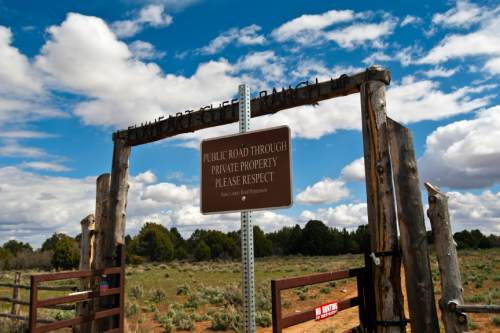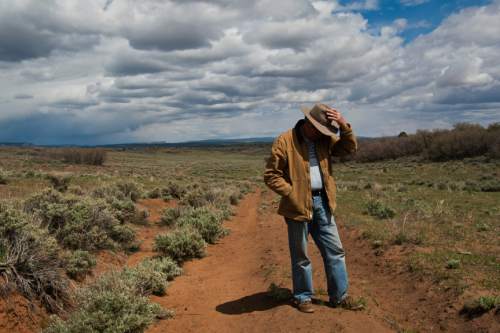This is an archived article that was published on sltrib.com in 2015, and information in the article may be outdated. It is provided only for personal research purposes and may not be reprinted.
The U.S. Supreme Court on Tuesday declined to hear Utah's appeal on a test case over rights-of-way across public land, letting stand a lower court ruling that could undermine counties' legal claims to many of these disputed routes.
The underlying case involved just a handful of roads in Kane County, but the ruling the state appealed affects its fight to gain title to many roads using the frontier-era law known as RS 2477.
Last year, the 10th Circuit Court of Appeals explored the question whether "the United States either explicitly or implicitly disputed the [state's] title" to the roads. In its ruling released last December, a three-judge panel concluded that it had not. Routes deemed open in the Bureau of Land Management's travel management plans lack sufficient controversy for the courts to determine who owns them under the federal Quiet Title Act.
This reasoning was affirmed Tuesday when the high court rejected the state's and Kane County's petitions to review the lower court's decision.
"The majority of the state's 12,000 claims would fall into this box of no disputed title. If the route is open, why is there this fight?" said Steve Bloch, legal director of the Southern Utah Wilderness Alliance. "It's important that the federal government should regulate these roads. It comes down to who's going to manage the public estate. The feds take a longer and broader view than the parochial view of the counties."
But lawyers for the state and the county argued the 10th Circuit's "constricted and unprecedented" interpretation undermines the goal of the old road statute, which was to encourage development of remote Western lands by ensuring local jurisdictions held rights to routes pioneers carved across the public domain. States today can prevail on RS 2477 claims if they can a demonstrate 10 years of continuous public use on a particular road prior to the law's repeal in 1976.
The routes at stake in the appeal are not particularly controversial because they are improved roads that do not enter wilderness quality lands and see regular vehicular traffic. They are Sand Dunes Road, a 20-mile thoroughfare in the southwestern part of Kane County, and a paved side road, along with four spurs called the Cave Lakes roads.
But at stake in the larger battle are what the state describes as "historic highways forged by those who long ago traveled west to establish homes and livelihoods, and that even today remain essential to state and local economies."
Bloch dismissed this notion as "revisionist" history aimed at legitimizing roads that don't serve an actual transportation purpose.
"That's the mythology they are trying to sink into our head. The truth is, these were people noodling around in the desert," he said.
Rural county commissioners, however, say the roads they are fighting for are crucial to the "health, safety and welfare" of their communities by providing access to public lands. Under federal control, they can be "arbitrarily" closed at great cost to those who depend on the access for their livelihoods.
Under the 10th Circuit's flawed logic, the feds "can unilaterally stop development simply by declining to take a definitive position on whether it claims title to the property," wrote state lawyers in their petition to the Supreme Court.
In about 25 lawsuits pending in federal court in Salt Lake City, Utah is demanding title to 12,000 routes, in partnership with the counties. In an effort to streamline this gargantuan judicial task, the court has appointed a special master to field arguments and testimony on a few "bellwether" routes in Kane and Garfield counties. The goal is to resolve issues common to entire categories of rights-of-way.
The feds have moved to dismiss hundreds of routes from the Kane and Garfield suits on the grounds that they are open to motorized use, and therefore no dispute exists.
Meanwhile, the state and feds are preparing for a showdown in the state Supreme Court over a technical legal question that could put an end to nearly all Utah's RS 2477 claims. The federal judges have asked the state justices to determine whether a "statute of repose" found in state law imposes a firm deadline on filing quiet title claims. This deadline expired back in the early 1980s, long before Utah began papering the courts with road claims, but it is unclear whether it is applicable in the RS2477 arena.
That matter is being briefed, and arguments are expected early next year.





